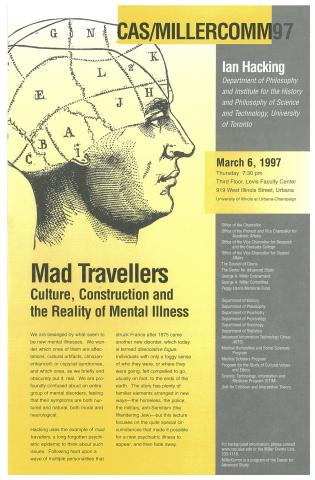Mad Travellers: Culture, Construction, and the Reality of Mental Illiness
Third Floor, Levis Faculty Center
919 West Illinois Street, Urbana
We are besieged by what seem to be new mental illnesses. We wonder which ones of them are affectations, cultural artifacts, clinician-enhanced, or copycat syndromes, and which ones, as we briefly and obscurely put it, real. We are profoundly confused about an entire group of mental disorders, feeling that their symptoms are both nurtured and natural, both moral and neurological.
Hacking uses the example of mad travellers, a long-forgotten psychiatric epidemic to think about such issues. Following upon a wave of multiple personalities that struck France after 1875 came another new disorder, which today is termed dissociative fugue. Individuals with only a foggy sense of who they were, or where they were going, felt compelled to go, usually on foot, to the ends of the earth. The story has plenty of familiar elements arranged in new ways—the homeless, the police, the military, anti-Semitism (the Wandering Jew)—but this lecture focuses on the quite special circumstances that made it possible for a new psychiatric illness to appear, and then fade away.
Cosponsored by: Office of the Chancellor, Office of the Provost and Vice Chancellor for Academic Affairs, Office of the Vice Chancellor for Research and the Graduate College, Office of the Vice Chancellor for Student Affairs, The Council of Deans, The Center for Advanced Study, George A. Miller Endowment, George A. Miller Committee, Peggy Harris Memorial Fund, Department of History, Department of Philosophy, Department of Psychiatry, Department of Psychology, Department of Sociology, Department of Statistics, Advanced Information Technology Group (AITG), Medical Humanities and Social Sciences Program, Medical Scholars Program, Program for the Study of Culture Values and Ethics, Science, Technology, Information and Medicine Program (STIM), Unit for Criticism and Interpretive Theory
Department of Philosophy and Institute for the History and Philosophy of Science and Technology, University of Toronto

